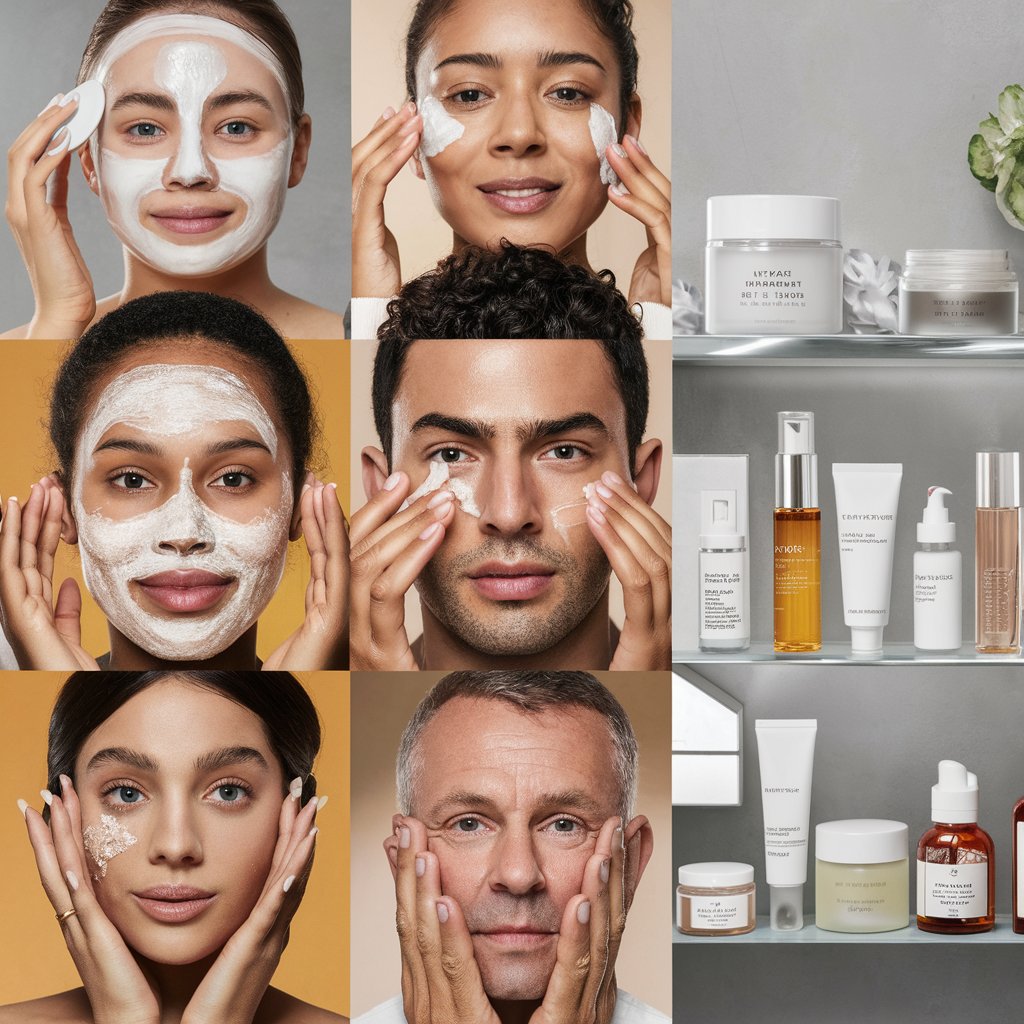The Ultimate Guide to Skin Care: A Comprehensive Approach
I. Understanding Your Skin
A. Skin Types
1. Normal Skin
2. Dry Skin
3. Oily Skin
B Skin Conditions
1. Acne
2. Rosacea
3. Eczema
C. Factors Affecting Skin Health
1. Diet and Nutrition
2. Hydration
3. Sun Exposure
II. Building a Daily Skincare Routine
A. Cleansing
1. Choosing the Right Cleanser
2. Double Cleansing Method
3. Exfoliation
B. Moisturizing
1. Finding the Best Moisturizer for Your Skin Type
2. Importance of Hydration
3. Nighttime Moisturizing
C. Sun Protection
1. Importance of SPF
2. Types of Sunscreen
3. Reapplication Tips
III. Choosing the Right Products
A. Ingredients to Look Out For
1. Hyaluronic Acid
2. Retinol
3. Vitamin C
B. Skincare Trends to Consider
1. Clean Beauty
2. K-Beauty
3. Sustainable Skincare
C. Reading Product Labels
1. Understanding Common Terms
2. Checking for Irritants
3. Patch Testing

IV. Lifestyle Habits for Healthy Skin
A. Hydration and Diet
1. Importance of Water Intake
2. Foods for Healthy Skin
3. Hydrating Habits
B. Stress Management
1. Impact of Stress on Skin
2. Relaxation Techniques
3. Adequate Sleep
C. Exercise and Skin Health
1. Benefits of Exercise
2. Skincare Before and After Workouts
3. Importance of Showering Post-Exercise

V. Professional Treatments and Special Considerations
A. Visiting a Dermatologist
1. Skin Checkups
2. Recommended Treatments
3. Prescription Skincare
B. Special Skin Concerns
1. Aging Skin
2. Sensitive Skin
3. Skin Care During Pregnancy
C. At-Home Care Tips
1. DIY Face Masks
2. Home Remedies
3. Routines for Different Seasons
Skin Types
- Normal Skin: This skin type is well-balanced, neither too oily nor too dry.
- Dry Skin: Characterized by a lack of moisture, often feeling tight or flaky.
- Oily Skin: Excess sebum production leading to a shiny complexion.
Skin Conditions
- Acne: Common skin condition caused by excess oil production and bacteria.
- Rosacea: Chronic skin condition causing redness and visible blood vessels.
- Eczema: Inflammatory skin condition resulting in red, itchy patches.
Factors Affecting Skin Health
- Diet and Nutrition: Eating a balanced diet rich in vitamins and minerals is crucial.
- Hydration: Drinking enough water helps maintain skin’s elasticity and glow.
- Sun Exposure: Protecting skin from harmful UV rays prevents premature aging.
Building a Daily Skincare Routine
Cleansing
- Choosing the Right Cleanser: Select a gentle cleanser suitable for your skin type.
- Double Cleansing Method: Using an oil-based cleanser followed by a water-based one.
- Exfoliation: Removing dead skin cells to reveal a smoother complexion.
Moisturizing
- Finding the Best Moisturizer: Opt for a hydrating moisturizer that suits your skin.
- Importance of Hydration: Keeping skin moisturized helps maintain its barrier function.
- Nighttime Moisturizing: Repair and rejuvenate skin while you sleep.
Sun Protection
- Importance of SPF: Shielding skin from UV radiation prevents sun damage.
- Types of Sunscreen: Choose between chemical and physical sunscreens for protection.
- Reapplication Tips: Remember to reapply sunscreen every few hours when outdoors.
Choosing the Right Products
Ingredients to Look Out For
- Hyaluronic Acid: Hydrates and plumps skin, reducing fine lines and wrinkles.
- Retinol: Stimulates collagen production and smooths skin texture.
- Vitamin C: Brightens skin tone and protects against free radicals.
Skincare Trends to Consider
- Clean Beauty: Opting for products free from harmful chemicals and additives.
- K-Beauty: Korean skincare practices focusing on hydration and gentle exfoliation.
- Sustainable Skincare: Supporting brands that prioritize eco-friendly practices.
Reading Product Labels
- Understanding Common Terms: Decode labels to know what ingredients are present.
- Checking for Irritants: Avoid skincare products with known allergens or irritants.
- Patch Testing: Test new products on a small area of skin to check for reactions.
Lifestyle Habits for Healthy Skin
Hydration and Diet
- Importance of Water Intake: Hydrate skin from the inside out by drinking enough water.
- Foods for Healthy Skin: Include fruits, vegetables, and foods rich in antioxidants in your diet.
- Hydrating Habits: Use a humidifier in dry environments to maintain skin’s moisture.
Stress Management
- Impact of Stress on Skin: Stress can trigger skin conditions like acne and eczema.
- Relaxation Techniques: Practice meditation, deep breathing, or yoga to reduce stress.
- Adequate Sleep: Aim for 7-9 hours of quality sleep each night to rejuvenate skin.
Exercise and Skin Health
- Benefits of Exercise: Improves circulation, promoting a healthy glow and clearer complexion.
- Skincare Before and After Workouts: Remove makeup before exercise and cleanse skin after.
- Importance of Showering Post-Exercise: Rinse off sweat to prevent clogged pores and breakouts.
Professional Treatments and Special Considerations
Visiting a Dermatologist
- Skin Checkups: Regular visits aid in detecting skin issues early for timely treatment.
- Recommended Treatments: Dermatologist-recommended procedures like chemical peels or laser therapy.
- Prescription Skincare: Prescription-strength products address specific skin concerns effectively.
Special Skin Concerns
- Aging Skin: Embrace anti-aging products with retinoids and peptides to combat signs of aging.
- Sensitive Skin: Choose gentle, fragrance-free products to avoid irritation and flare-ups.
- Skin Care During Pregnancy: Adjust skincare routine to use pregnancy-safe products for hormonal changes.
At-Home Care Tips
- DIY Face Masks: Treat skin with natural ingredients like honey, yogurt, or avocado.
- Home Remedies: Incorporate oats, aloe vera, or tea tree oil for soothing skin treatments.
- Routines for Different Seasons: Adjust skincare products based on seasonal changes for optimal skin health.
Summary:
In summary, taking care of your skin involves understanding your skin type, building a daily skincare routine, choosing the right products, adopting healthy lifestyle habits, and seeking professional treatments when needed. By incorporating these practices into your daily life, you can achieve healthy, glowing skin that you can be proud of.
FAQs:
- How often should I exfoliate my skin?
- What is the best way to treat acne-prone skin?
- Can I use multiple skincare products at once?
